Is Our World Getting Better and Better?
And now, some good news. Did you know that global poverty is going down? Did you know that global literacy is going up? Did you know that violent crime statistics are dropping and IQs are rising? Did you know that child labor and exploitation are decreasing and human rights are increasing?
Our headlines are full of social division, political gridlock, international disorder, increasing militarization, environmental disasters and other problems. Watch the news for half an hour, and it certainly appears that world conditions are getting worse and worse.
But some intelligent people argue that since news coverage inherently focuses on danger, suffering and trauma, we are seeing a distorted picture of the world. They argue that the data shows a tremendous amount of human progress. And their arguments are compelling.
So, is the world getting better and better? Or are we on the brink of World War iii? Or both?
Measuring Progress
Harvard University psychology professor Steven Pinker believes you are too pessimistic. His recent book, Enlightenment Now: The Case for Reason, Science, Humanism and Progress, makes a sustained argument that the world is, in fact, getting better.
In a ted Talk based on the book, Pinker said, “Many people face the news each morning with trepidation and dread. Every day, we read of shootings, inequality, pollution, dictatorship, war and the spread of nuclear weapons. … You can always fool yourself into seeing a decline if you compare bleeding headlines of the present with rose-tinted images of the past. What does the trajectory of the world look like when we measure well-being over time using a constant yardstick?”
He then compared some recent statistics to the same metrics from 30 years ago. It may surprise you to learn that the homicide rate in America has dropped from 8.5 per 100,000 to 5.3. The percentage of Americans below the poverty line (as measured by consumption) has fallen from 11 percent to 3 percent. The percentage of the world population in extreme poverty has plunged from 37 percent to 9.6 percent. Three decades ago, 23 wars were raging; as of February 2018, there were only 12. The number of nuclear weapons has dropped from 60,780 to 10,325. The number of democracies has grown from 45 governments over 2 billion people to 103 governments over 4.1 billion people.
Look at a broader time line: Over the last 200 years, life expectancy for a human being has increased from about 30 years to 71 years. Infant mortality has plummeted from 33 percent to 6 percent. Infectious diseases, undernourishment and catastrophic famines are disappearing, even in poor countries. Poverty is declining: The world is now about 100 times wealthier than it was in the early 1800s.
These are some striking developments, and they are indeed easy to take for granted. We don’t tend to think about how much safer, healthier, wealthier and long-living the average person is compared to a few generations ago. But what a difference!
Another exciting trend is the rise in literacy. Two centuries ago, only 12 percent of the world could read and write. Today, it is 86 percent. After the basic needs of food, shelter and clothing, literacy is crucial not only to quality of life, but also to intellectual and even spiritual development.
Some specific statistics or trends that observers like Pinker cite may be a matter for debate. But many are legitimately, indisputably worth celebrating.
Many people looking at these measurements are concluding that the world is getting better and better, and we just need to keep doing what we have been doing. For example, then U.S. President Barack Obama said in 2016: “[T]he world has never been less violent, healthier, better educated, more tolerant, with more opportunity for more people, and more connected than it is today.”
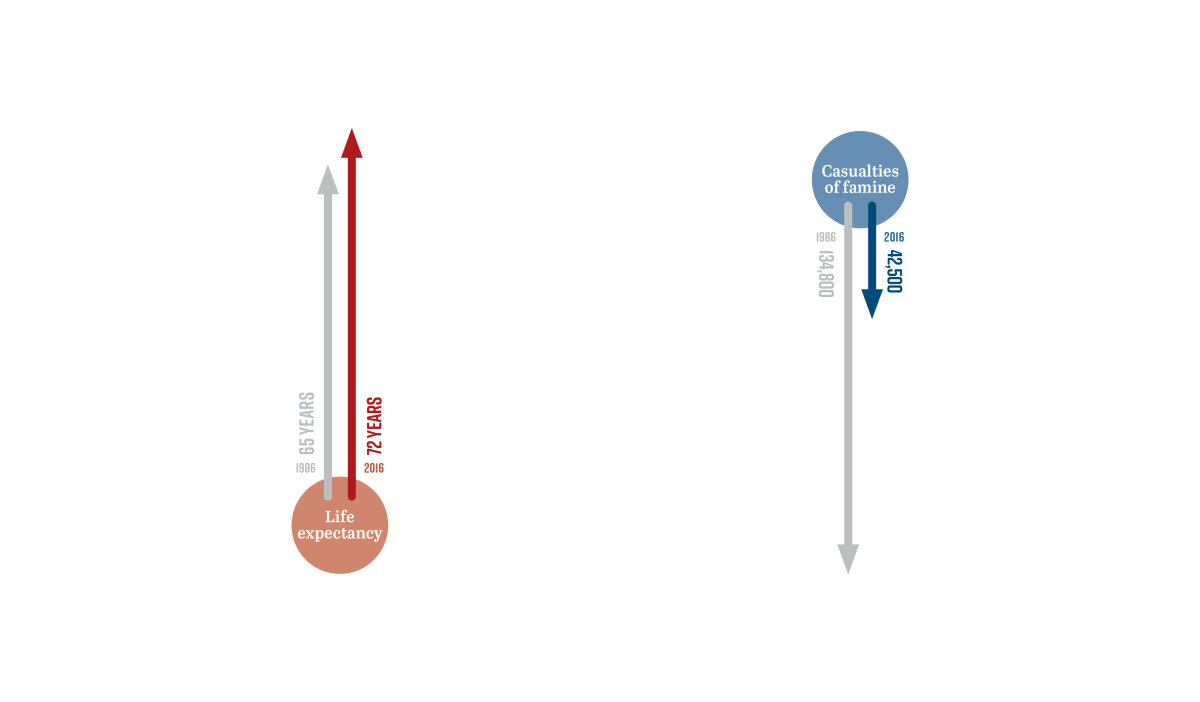
Yet the question remains: Why, at the same time people are eating better, consuming more and living longer, do so many of us have the sense that we are approaching a global catastrophe? Pinker’s explanation is that media coverage is a major culprit. “You never see a journalist who says, ‘I’m reporting live from a country that has been at peace for 40 years,’ or a city that has not been attacked by terrorists,” he said. “[I]f you combine our cognitive biases with the nature of news, you can see why the world has been coming to an end for a very long time indeed.”
He makes it sound like warnings about the end of the world are just so much hype. Is that a valid conclusion to draw from these statistics?
Why Progress?
Seeing the improving measurements of human development naturally raises the question, what is the cause? Why are people living longer, earning more money, receiving better educations?
Pinker answers this way: “Progress is not some mystical force or dialectic lifting us ever higher. It’s not a mysterious arc of history bending toward justice. It’s the result of human efforts governed by an idea, an idea that we associate with the 18th-century Enlightenment, namely that if we apply reason and science that enhance human well-being, we can gradually succeed. … We will never have a perfect world, and it would be dangerous to seek one. But there’s no limit to the betterments we can attain if we continue to apply knowledge to enhance human flourishing. This heroic story is not just another myth. Myths are fictions, but this one is true, true to the best of our knowledge, which is the only truth we can have.”
In a Wall Street Journal article on the same subject, Pinker summed it up this way: “Our ancestors replaced dogma, tradition and authority with reason, debate and institutions of truth-seeking. They replaced superstition and magic with science. And they shifted their values from the glory of the tribe, nation, race, class or faith toward universal human flourishing” (February 13). He gives a lot of specific examples of how these approaches have produced advancements in medicine, health, food production, public safety, and peace among nations. The effects are improved health, nutrition, wealth, safety, freedom and peace among nations. The basic cause, he says is human ability.
By this view, human history is something of a giant ramp, leading from human misery and ignorance upward toward greater human accomplishment and happiness. It is consistent with the evolutionary model: We have evolved from basic elements to single-cell organisms to more complex life forms, and are evolving to become smarter, more capable and more resilient. We used to write on papyrus, now we communicate with smartphones. We used to build chariots, now we build spacecraft. Surely, then, we human beings who have developed amazing technology can develop systems to end things like crime and war.
This theory has some dangerous flaws.
Material Progress—Spiritual Absence
Look again at the metrics of human progress over the past 200 years, and you can clearly see that most of them have to do with material issues. They deal with matter, with physical elements. They deal less—or not at all—with relationships between human beings.
“Why do we find a world of awesome advancement and progress, yet paradoxically with appalling and mounting evils?” Herbert W. Armstrong asked in Mystery of the Ages. “Why cannot the minds that develop spacecraft, computers and marvels of science, technology and industry solve the problems that demonstrate human helplessness? … The developed nations have made awesome progress. They have produced a highly mechanized world providing every luxury, modern convenience and means of pleasure. Yet they are cursed with crime, violence, injustice, sickness and disease, broken homes and families.”
The reason for this paradox is that mankind is cut off from true spiritual knowledge. This truth is explained in Mystery of the Ages(which we will send you free upon request). More on this later.
Human history includes a great deal of false spiritual information, superstition and dogma. And as this has been challenged in recent centuries, there has been a corresponding leap forward in material knowledge. The Western world and much of humanity has managed to build an enormous bank of knowledge since the Dark Ages. In the past century, scientific knowledge production has multiplied exponentially.
This has not, however, filled the void of true spiritual knowledge, which cannot be discovered materially or scientifically.
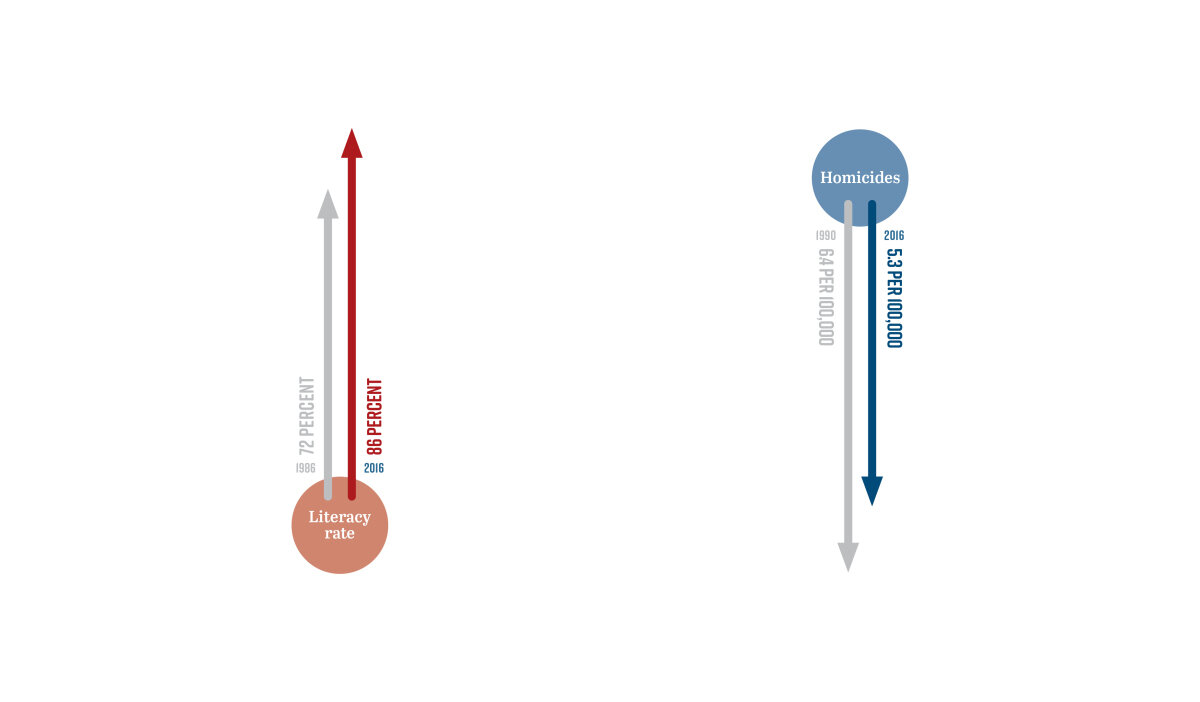
Though material knowledge has increased, the limits of this progress, absent that spiritual dimension, are already becoming evident. Some human advancements have peaked and are now declining. And some advancements have long-term consequences that have not yet fully come due.
Take for example the remarkable decrease in famine, for which Pinker credits crop rotation, synthetic fertilizers, hybrids and machinery. These processes do produce more food, and starvation is dramatically lower because of them. But to achieve this, we have exhausted and depleted our soils of nutrients. If we do not continue applying more and more synthetic fertilizers and industrial farming methods, huge areas will quickly become deserts. Meanwhile, these soils are producing less nutritious foods. Hence the explosion of chronic disease and the mushrooming need for clinics, medical complexes, hospitals, cancer centers and hospices.
Pinker highlights welfare programs as another advancement. But the legitimate needs these programs fill are accompanied by massive and growing abuses, bloat and political distortion. Nations are literally going into monumental, bankrupting debt to provide these “advancements.”
This is true of the high costs of many of our modern miracle solutions to age-old problems. We are effectively buying advancement by going into debt—a debt that we or our children will eventually have to pay. A day of reckoning is coming.
Conditions might be better now than they were 30 years ago. But that does not mean they will be better 30 years from now.
The Reversing Trend
Some of our advancements are already regressing. For example, while Pinker says average IQs have risen some 30 points in the last two centuries, a massive recent study showed a 7-point drop per generation in recent times.
More generally, some ideals that Pinker (to a degree correctly) credits with having helped human progress are fading away. Our current generation is actually renouncing some of the basic principles that led to increased stability, opportunity, success and justice for millions of people over hundreds of years.
Paul Bonicelli served in the United States Agency for International Development and the House of Representatives Foreign Affairs Committee. He wrote for the Federalist: “Although the Enlightenment has indeed been ‘working’ for some time now, ameliorating the human condition all over the world, in recent years it has been definitively rejected by the modern left and by some elements of the right. On college campuses, Enlightenment ideas about the rule of law and freedom of speech have been replaced by campus tribunals and the heckler’s veto. The Enlightenment itself is condemned for being the project of racist white men and the product of societies devoted to empire and colonialism. Even the Enlightenment notion of objective truth is scoffed at by academics and activists alike” (February 14).
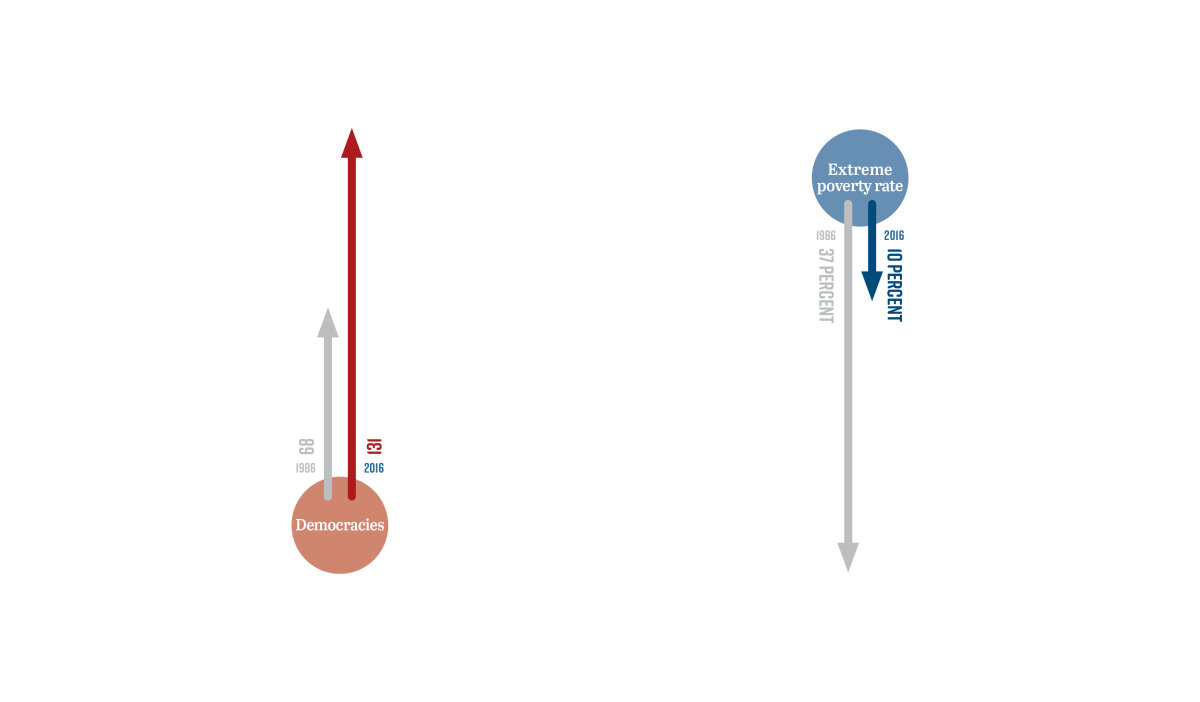
The rule of law, the reliability of rational thought, the fact that there is such a thing as truth—these are vital principles for stability and long-term prosperity that we have taken for granted for generations. But now they are being rejected.
Even democracy is in retreat. “The heady democratic expansion of the 1990s has been replaced by democratic stagnation or even recession,” wrote Foreign Policy (Sept. 8, 2016). The Brookings Institution says some analysts and policymakers believe democracy “has run its course.” Freedom House’s 2018 Freedom in the World study found for the 12th year in a row that democracy is decreasing around the world: “[C]ountries that suffered democratic setbacks outnumbered those that registered gains. States that a decade ago seemed like promising success stories—Turkey and Hungary, for example—are sliding into authoritarian rule. The military in Myanmar, which began a limited democratic opening in 2010, executed a shocking campaign of ethnic cleansing in 2017 and rebuffed international criticism of its actions. Meanwhile, the world’s most powerful democracies are mired in seemingly intractable problems at home, including social and economic disparities, partisan fragmentation, terrorist attacks, and an influx of refugees that has strained alliances and increased fears of the ‘other.’”
As democracies decay, authoritarians are rising in several countries, including some of the most important nations in the world. Russian President Vladimir Putin has encouraged a cult of personality, made a mockery of Russia’s elections, changed its Constitution, crushed dissent, assassinated journalists, started wars, and invaded and annexed territory. Chinese President Xi Jinping has made similar changes to his country’s government, granting himself more power for longer periods and increasing his control over China’s people and military. Strongmen have risen in the Philippines, Thailand, Turkey, Saudi Arabia, Hungary, Austria and elsewhere. The next one might take over Germany.
If humans truly are getting better and better, then the rule of law, democracy and absolute truth were steps up the ramp of progress. Now we are rejecting those principles. By definition, this cannot be another step up the ramp to a better and better world.
An Age of Greater Danger
As we witness the decline of democracy and rise of authoritarianism, we are seeing an increase in military spending globally. Our advanced world is using its increased education, technology and wealth to produce chemical, biological and nuclear weapons and missiles, jets, ships and submarines that can launch them within minutes. In one sense, these weapons systems are an amazing advancement. In another, they are the world’s worst form of regression.
Yale Global Online reported that 23 nations stockpile chemical weapons of mass destruction or have the capacity to produce them: China, Egypt, India, Indonesia, Iran, Iraq, Israel, Japan, Kazakhstan, Libya, Myanmar, North Korea, Pakistan, Russia, Saudi Arabia, Serbia, South Africa, South Korea, Sudan, Syria, Taiwan, the U.S. and Vietnam.
The estimated number of nuclear weapons indeed has fallen from 60,780 to 10,325. The United States is no longer in a race against the Soviet Union to produce a larger stockpile of warheads. But the U.S., Russia, China, Europe, Iran, other nations and even terrorists are still racing to produce newer, better, more effective weapons.
It only takes one nuclear weapon to incinerate an entire city of human progress. And a nuclear war would not stop with one strike. Nuclear, chemical and biological weapons are in the hands of imperfect, flawed human beings with limited knowledge and capacities. Some of these human beings are some of the most unstable and radical minds on this planet.
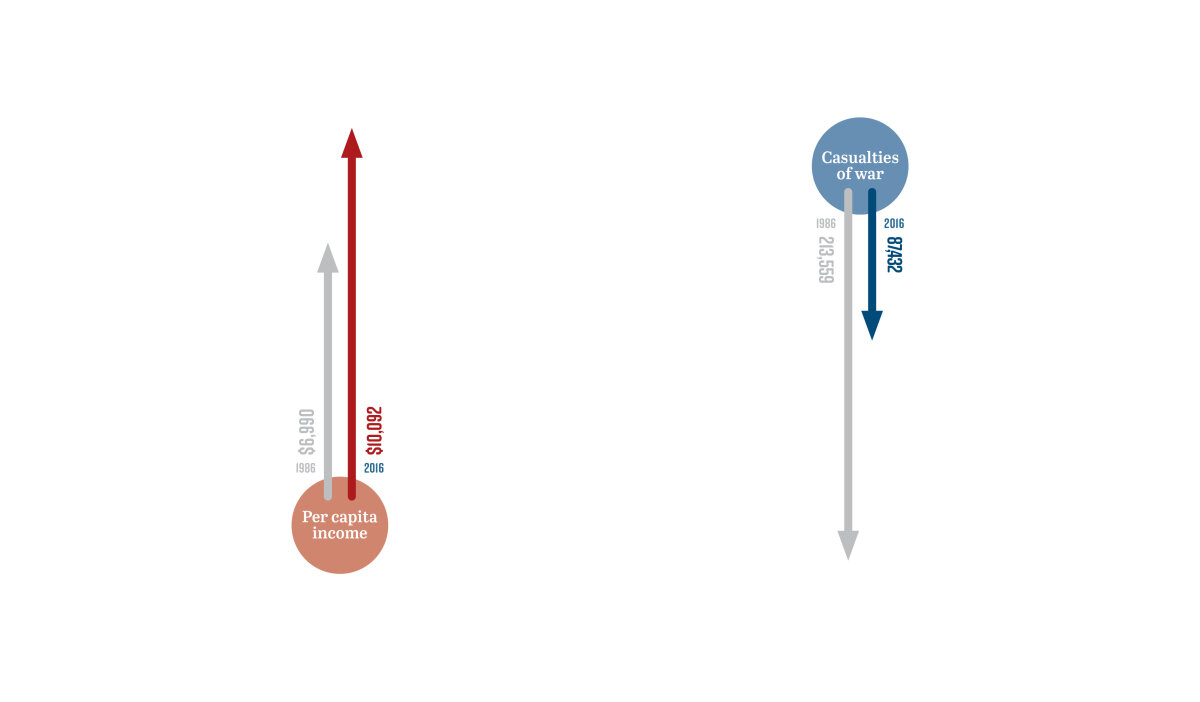
Entire cities of advancements in sanitation, nutrition, health, commerce, thinking, liberty and law could disappear in a moment if Donald Trump, Theresa May, Benjamin Netanyahu, Emmanuel Macron, Narendra Modi, Shahid Khaqan Abbasi, Vladimir Putin, Xi Jinping or Kim Jong-un presses a button to deploy a nuclear arsenal. Thousands of people have died and will die in inhumane ways if Bashar Assad, Abdel Fattah al-Sisi, Ali Khamenei, Moon Jae-in or others launch biological or chemical weapons. We human beings have thousands and thousands and thousands of these fiendish “advancements” just waiting to detonate.
This is a grim corollary to all the material progress—and a dangerous consequence of the fact that this physical development has come with no corresponding rise in true spiritual understanding.
We Have Been Wrong Before
Pinker is not the only thinker to present reasoned arguments why the world is getting better and better. In fact, experts throughout history have predicted peace and prosperity—right before war and disaster.
Even without those experts, we tend to presume that peace will continue indefinitely. But beyond our limited perspectives, there are threats that can dramatically change our lives and the lives of everyone on this planet.
British philosopher Bertrand Russell wrote that livestock animals come to expect food when they see the farmer, but in the end the farmer butchers them. Because something happens often, we assume it will last forever. But a catastrophe that ends your world only has to happen once. In fact, it can happen only once. Which is why you must remain vigilant.
History records a long list of confident, educated, yet terribly wrong prognostications of peace.
“[U]nquestionably, there was never a time in the history of this country when from the situation of Europe we might more reasonably expect 15 years of peace than at the present moment.” That was the British prime minister in 1792. Within one year, revolutionary France plunged Europe into the start of the Napoleonic Wars that killed millions of people.
Britain’s undersecretary at the Foreign Office informed the foreign secretary that “he had never, during his long experience, known so great a lull in foreign affairs, and that he was not aware of any important question that he should have to deal with.” That was in 1870. The same day, a new prince was crowned in Spain, resulting in the Franco-Prussian War that killed roughly half a million people.
“We old people will probably not live to see the decisive battles of the coming revolution.” That was a man named Vladimir Lenin speaking in the winter of 1917. Six weeks later, the Russian Revolution began. The ensuing Russian Civil War cost an estimated 10 million lives, the worst civil war in recorded human history.
“My good friends, for the second time in our history, a British prime minister has returned from Germany bringing peace with honor. I believe it is peace for our time. We thank you from the bottom of our hearts. Go home and get a nice, quiet sleep.” That was Neville Chamberlain, after signing an agreement with Adolf Hitler. A year later, World War ii began. It did not end until around 80 million lives had been lost.
How would you sum up this tendency in human nature? You could summarize it this way: “When they say ‘Peace and safety,’ then sudden destruction comes upon them.”

‘Peace and Safety’
The greatest analysis of human nature and the greatest indicator of future events are found in the book written by the Creator of human beings. The Holy Bible contains numerous prophecies that state in detail how massive, global destruction is going to come suddenly. Those who study their Bibles and study world events will be able to see this disaster coming. Those who do not will be blindsided.
Many people don’t realize it, but Jesus Himself was a prophet. Days before His crucifixion, His disciples asked Him to describe the events that would occur just before His return. He responded with the most pivotal prophecy of the New Testament, recorded in Matthew 24.
The signs that Jesus Christ said would precede His return included one cataclysm after another! He warned of wars, rumors of wars, nations rising against nations, famines, pestilences, earthquakes, and the worst period of suffering in human history: “For then shall be great tribulation, such as was not since the beginning of the world to this time, no, nor ever shall be. And except those days should be shortened, there should no flesh be saved: but for the elect’s sake those days shall be shortened” (Matthew 24:21-22).
Jesus was prophesying human annihilation!
This was not possible during His human lifetime. In fact, it was not possible until the second half of the 20th century, with the development of nuclear, biological and chemical weapons. Jesus prophesied human annihilation to occur in the modern era!
After describing His spectacular return in glory, Jesus said to be vigilant, because “of that day and hour knoweth no man, no, not the angels of heaven, but my Father only” (verse 36). He exhorted His disciples to urgently watch for biblical signs to know when His return was at hand. Those signs amount to the imminent suicide of the human race! That is where our “advancement” is leading us.
Look at History
Jesus also used a historical example to describe the human condition prior to His return. “But as the days of Noe [Noah] were, so shall also the coming of the Son of man be” (Matthew 24:37). What were world populations doing during Noah’s generation? They were “eating and drinking, marrying and giving in marriage” (verses 38-39). People were engaging in pleasures within their “advanced” civilization. They did not fear a major cataclysm. But when God looked at the same civilization, He saw “that the wickedness of man was great in the earth, and that every imagination of the thoughts of his heart was only evil continually. … The earth also was corrupt before God, and the earth was filled with violence. … [A]ll flesh had corrupted his way upon the earth” (Genesis 6:5, 11-12).
Noah warned the others around him, but they continued pursuing their pleasures and their evils. And, as Jesus said, they “knew not until the flood came, and took them all away;so shall also the coming of the Son of man be” (Matthew 24:39).
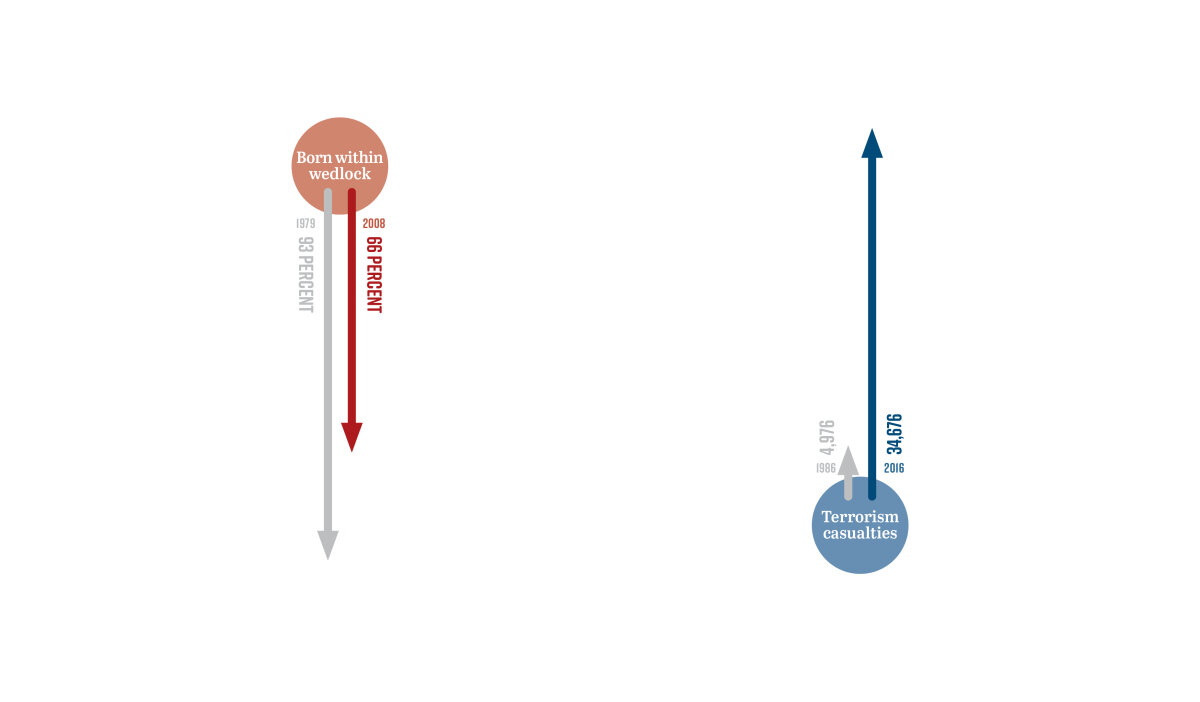
These people were self-confident yet self-deceived. They did not think that every one of their deep-down thoughts was only evil continually. But they were. And God wiped them out rather than let them twist their minds beyond redemption.
“Likewise also as it was in the days of Lot; they did eat, they drank, they bought, they sold, they planted, they builded; But the same day that Lot went out of Sodom it rained fire and brimstone from heaven, and destroyed them all. Even thus shall it be in the day when the Son of man is revealed” (Luke 17:28-30).
People going about their business in central Sodom or enjoying a social event on the outskirts of Gomorrah saw no reason why their luxury, decadence and excess would not get better and better. Then in one afternoon it all turned into smoke.
Steven Pinker considers our tolerance, embracing and praising of homosexuality as one sign of the progress of our modern world. God loves sinners, but He hates sin because it degrades and destroys human advancement and human happiness. He knows how destructive sin is—and eventually He will wipe it out.
Put Christ’s prophecies together with other Bible prophecies, and it is clear that He is about to allow human beings to flood Earth with nuclear fire.
Here is what Jesus instructed His disciples: “Watch therefore: for ye know not what hour your Lord doth come. … Therefore be ye also ready: for in such an hour as ye think not the Son of man cometh” (Matthew 24:42, 44). Luke 21:34-35 quote Jesus as saying, “But watch yourselves lest your hearts be weighed down with dissipation and drunkenness and cares of this life, and that day come upon you suddenly like a trap. For it will come upon all who dwell on the face of the whole earth” (English Standard Version).
Multiple Warnings
The Bible repeatedly warns about how the human experiment will end. The book of Lamentations describes an ancient destruction that foreshadows the same modern catastrophe that Jesus prophesied. “Those who feasted on dainties perish in the streets; those who were brought up in purple lie on ash heaps. For the chastisement of the daughter of my people has been greater than the punishment of Sodom, which was overthrown in a moment …” (Lamentations 4:5-6; Revised Standard Version).
Isaiah 56:10-12 describe the approaching dangers and specifically indicts the leaders who should be warning about them, saying, “[T]hey are all ignorant, they are all dumb [mute] dogs, they cannot bark; sleeping, lying down, loving to slumber.” Those who should be sounding the alarm just care “every one for his [own] gain.” “Come ye, say they, I will fetch wine, and we will fill ourselves with strong drink; and to morrow shall be as this day, and much more abundant.” Life is getting better and better.
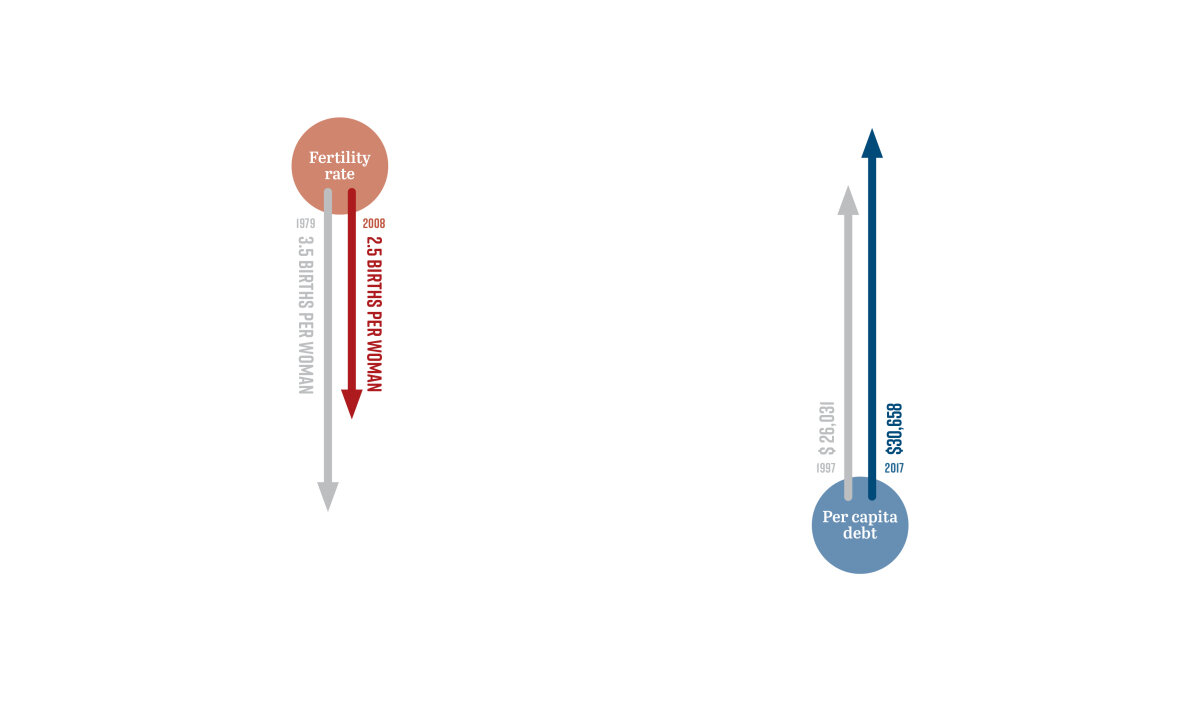
With 24-hour news coverage, we do notice wars, rumors of wars, environmental disasters and other calamities. But we don’t care. Not enough to do something. Instead we fetch another glass of wine as we flip from cnn, to Fox, to msnbc, to espn.
Isaiah 22:13 prophesies that people will actually recognize that conditions are bad, but then respond by glutting themselves on excess, thinking, “[L]et us eat and drink; for to morrow we shall die.”
“But of the times and the seasons, brethren, ye have no need that I write unto you,” the Apostle Paul wrote in 1 Thessalonians 5:1-3. “For yourselves know perfectly that the day of the Lord so cometh as a thief in the night. For when they shall say, Peace and safety; then sudden destruction cometh upon them ….”
It’s sudden. It happens in a day. It’s unexpected. It’s a trap snapping shut. And it is catastrophic.
Warning and Hope
Isaiah 30:8 shows that God instructed His servant to write down His words, to “note it in a book, that it may be for the time to come for ever and ever.” What did God want to be recorded and preserved? “That this is a rebellious people, lying children, children that will not hear the law of the Lord: Which say to the seers, See not; and to the prophets, Prophesy not unto us right things, speak unto us smooth things, prophesy deceits” (verses 9-10).
That is human nature. People don’t want to hear truth. They want to hear good news, even if it’s fake. They want to hear that our generation is smarter, more just, more enlightened than ever before.
The Trumpet exists to fight that “prophesy not” spirit. We proclaim what Isaiah recorded in the next few verses: “Therefore thus says the Holy One of Israel, ‘Because you despise this word … therefore this iniquity shall be to you like a break in a high wall, bulging out, and about to collapse, whose crash comes suddenly, in an instant’” (verses 12-13; rsv).
God recorded the prophecies of Isaiah and the Apostle Paul and Jesus Christ. He preserved them for thousands of years. He provides them to us today. Throughout history, whether it was the contemporaries of Noah or of the Israelites or of the New Testament Church, God has used individuals and groups of people to deliver His words of warning to those who will listen.
Today, the Trumpet is that voice. The Trumpet is responsible for conveying the principles of the Bible as well as its prophecies. Many people assume that “ethics” and “morals” are private issues that each person decides for himself. They assume that local, national and world events have nothing to do with how we live our private lives. But world events—and world disasters—are the direct result of our private lives!
Human sin leads to human suffering. Human obedience to God’s law leads to human happiness. Proclaiming these truths is the duty of the Trumpet.
Human beings cannot discern right from wrong through human reasoning. God’s Word is what defines good and evil. In fact, it defines what human progress really is. It accurately reveals not only the effects but also the causes. And it specifically, powerfully, repeatedly warns what will happen to enormous populations of people—because of sin!
The question of whether the world is getting better and better in material terms is not nearly as important as what the spiritual state of the world is. And if you are judging by God’s standard, the answer to that question is undeniably clear. And the consequences are frighteningly real.
What Will You Do?
The Trumpet’s warning message is not just for the public in general. It is for you individually. If you can prove what the Trumpet is warning from your Bible and from your news feed, your responsibility is to heed this message.
“He who is often rebuked, and hardens his neck, Will suddenly be destroyed, and that without remedy” (Proverbs 29:1; New King James Version).
Many people silently sit back and passively disagree with certain issues. But they don’t act. Many people read the Trumpet and agree with much or most of what we publish. But they don’t act.
God says that if you hear and agree but you don’t act, you are deceiving yourself (James 1:22).
When Jesus came to Earth the first time, He announced the coming of God’s Kingdom. To those few who listened and who heeded, He said, “Repent: for the kingdom of heaven is at hand.”
Right now, you are seeing signs of the disasters that will explode before Jesus Christ returns. His coming is at hand. Will you repent? Don’t wait. Don’t just move on with your life. Don’t return to your comfortable routine. Be “pricked in your heart,” like those whom the Apostle Peter warned, and ask, “[W]hat shall we do?” (Acts 2:37).
There is an answer. “Repent, and be baptized every one of you in the name of Jesus Christ for the remission of sins, and ye shall receive the gift of the Holy [Spirit],” Peter said (verse 38). How do you repent? How can you be baptized? How can you receive God’s Holy Spirit? How can you escape the disasters facing our world? How can you support God’s work? We can show you. Contact us through the information on the back cover of this magazine.
You can avoid the coming man-made disaster. You can learn what progress really is. But only if you take action.
